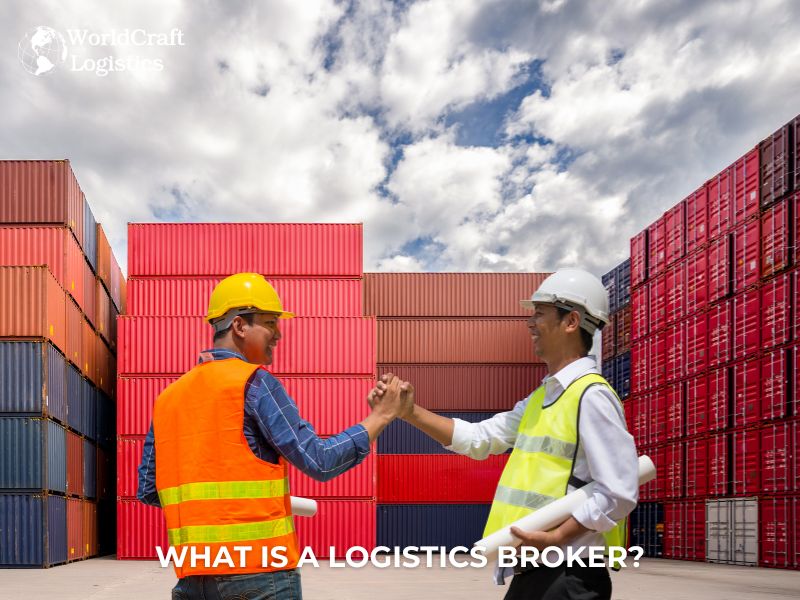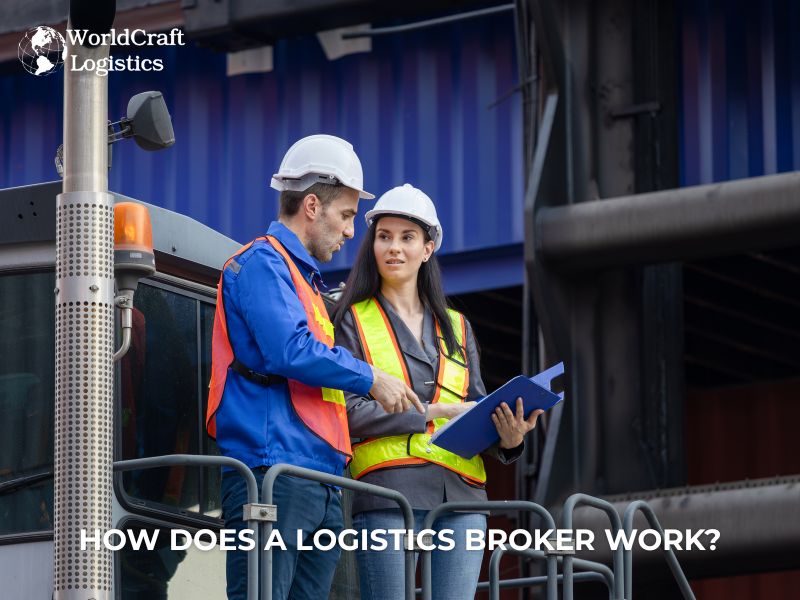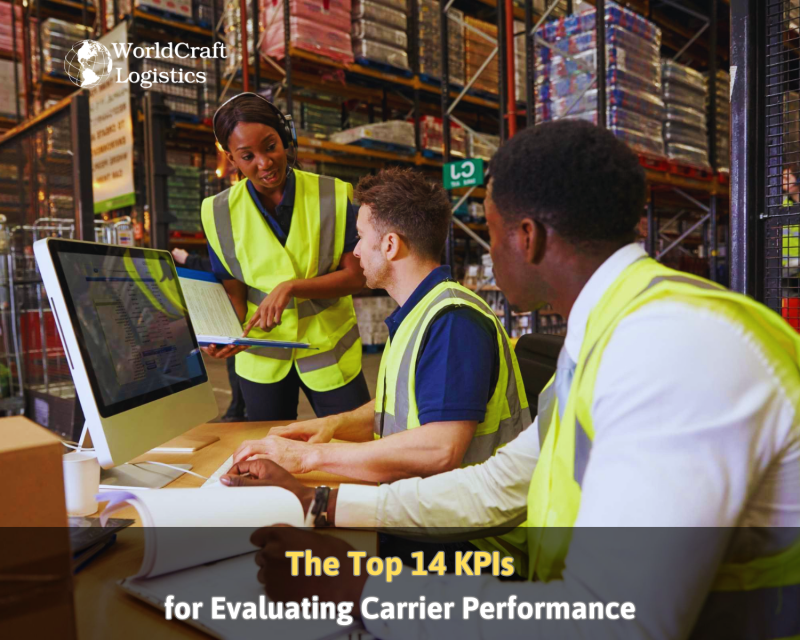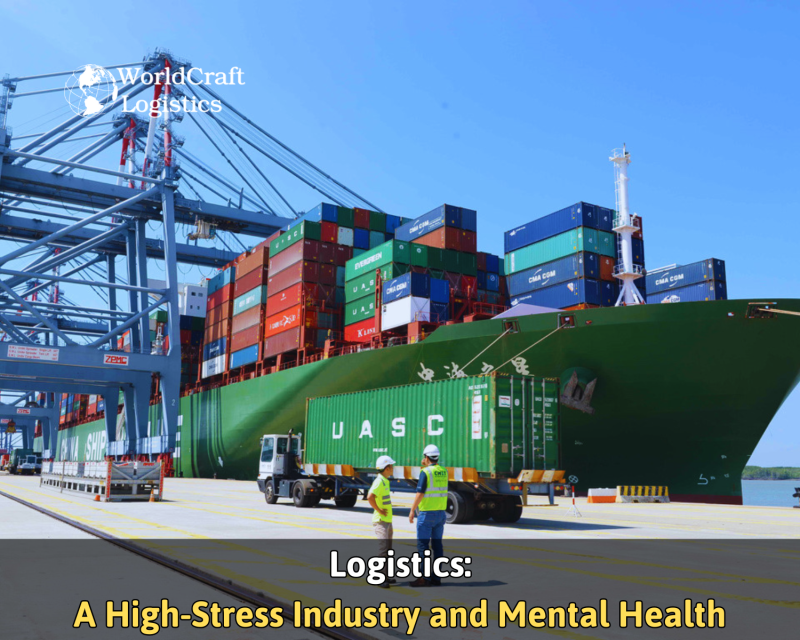
Starting June 1st, 2023 Our warehouse fee will be $0.65/cubic foot per month
In effort to lower the warehouse storage fee during inflation, we have went narrow aisle racking.This construction took us four months but the project is finally completed. With narrow aisle racking, we are able to drop storage by 24%.We as partners will go through this inflation together.
09/16/2025
A logistics broker can make the difference between a smooth supply chain and costly disruptions, yet many businesses and professionals still misunderstand what this role truly involves. Is a broker just a middleman, or a strategic partner that safeguards profit margins and ensures on-time delivery? In this guide, we break down what a logistics broker does, the essential skills required, how much they can earn, and why working with one can give companies a decisive advantage in today’s unpredictable freight market.

A logistics broker sometimes referred to as a freight broker is a licensed professional or company that arranges transportation services between shippers and carriers. Unlike a carrier that owns trucks or ships, a logistics broker does not physically transport goods. Instead, they leverage an extensive network of vetted carriers, negotiate competitive freight rates, and oversee the movement of cargo from pick-up to delivery.
The primary responsibility of a logistics broker is to act as a trusted intermediary. They balance the needs of shippers, who require timely and cost-effective delivery, with the resources of carriers, who want to maximize equipment utilization and maintain profitability. By coordinating both sides, brokers reduce inefficiencies in the supply chain, minimize empty miles, and improve overall shipping outcomes.
From small businesses seeking to move a few pallets to multinational corporations with global distribution requirements, logistics brokers play a vital role in ensuring that shipments reach their destination on time, in compliance with regulations, and at an optimized cost.

The role of a logistics broker extends far beyond connecting shippers with carriers. In practice, brokers act as supply chain consultants, market analysts, and problem-solvers who continuously optimize transportation strategies. Their responsibilities can be divided into several critical areas:
Supply Chain Mapping
A logistics broker begins by analyzing a client’s shipping needs in detail. This includes reviewing shipment volumes, delivery locations, and service requirements. By mapping the supply chain, brokers can identify the most cost-effective and reliable transportation solutions.
Reviewing Market Conditions
Freight markets fluctuate daily due to fuel prices, seasonal demand, and carrier availability. An experienced broker monitors these conditions in real time, ensuring clients benefit from competitive pricing while maintaining service consistency.
Identifying Operational Inefficiencies
Brokers often uncover hidden inefficiencies, such as underutilized equipment, redundant routes, or poor carrier performance. Correcting these issues improves delivery speed, reduces costs, and increases overall supply chain resilience.
Outlining Opportunities for Improvement
Beyond fixing problems, a logistics broker highlights opportunities for growth—such as consolidating shipments, exploring intermodal solutions, or partnering with specialized carriers for niche freight.
Implementing and Managing Changes
Finally, brokers ensure that improvements are executed smoothly. They coordinate with carriers, track shipments, and manage compliance documentation, while providing clients with transparency through regular updates and performance reports.

To understand the real value of a logistics broker, it helps to examine how a shipment is managed from the initial order to final delivery. This process, often referred to as the “life of a load,” demonstrates how brokers orchestrate complex operations while minimizing risk and cost.
The process begins when a shipper provides details of a shipment, including weight, dimensions, destination, and delivery timeline. The broker confirms requirements and begins sourcing the best carrier option.
At this stage, the logistics broker evaluates available modes, capacity, and cost structures. They consider market conditions, compliance issues, and the carrier’s track record before finalizing the plan.
Scheduling involves aligning shipment pickup times, coordinating with carriers, and ensuring that delivery commitments match the customer’s service expectations.
Once a carrier is assigned, the broker issues dispatch instructions and maintains continuous communication with both the shipper and the driver, ensuring all parties stay informed.
The broker monitors the loading process, verifies documentation, and tracks the shipment in real time. During transit, they proactively address delays, rerouting needs, or unforeseen issues.
When the cargo arrives, the broker oversees unloading and confirms successful delivery according to agreed-upon KPIs.
The final step involves invoicing, auditing freight bills, and ensuring compliance with all regulatory requirements. Accurate documentation reduces disputes and improves trust between shippers and carriers.

Succeeding as a logistics broker requires more than industry knowledge. It demands a blend of technical, interpersonal, and problem-solving skills that allow brokers to navigate a constantly changing freight environment. Employers and clients alike value brokers who can balance operational efficiency with customer satisfaction.
A logistics broker must negotiate competitive freight rates with carriers while assuring shippers of reliable service. Strong communication skills are critical for building trust and resolving disputes quickly.
Transportation markets can shift without warning. Brokers who analyze data, evaluate risks, and propose alternative solutions help shippers avoid costly delays and maintain supply chain resilience.
Access to a broad, qualified carrier base is one of the greatest advantages of working with a logistics broker. Brokers must cultivate relationships with carriers, verify safety and compliance records, and match the right carrier to each shipment.
Modern brokers rely on transportation management systems (TMS), load boards, and real-time tracking software to manage shipments efficiently or combined with AI management tools. A skilled broker understands how to leverage these tools for visibility and performance.
From Federal Motor Carrier Safety Administration (FMCSA) requirements in the United States to customs regulations for international shipments, a logistics broker must stay current with all compliance obligations. This ensures legal, safe, and efficient freight movement.

The path to becoming a logistics broker blends education, licensing, and hands-on industry experience. While there is no single formula for success, certain steps are widely recognized as essential for anyone entering this profession.
A college degree is not always required, but coursework in supply chain management, business administration, or logistics can provide a strong foundation. Many aspiring brokers also invest in logistics broker classes or online certifications to gain practical insights into freight operations and regulations.
In the United States, a logistics broker must be licensed by the Federal Motor Carrier Safety Administration (FMCSA). Applicants are required to:
Obtain a USDOT number and broker authority.
File a BOC-3 (Designation of Process Agents).
Secure a surety bond or trust fund (minimum of $75,000).
These requirements demonstrate financial responsibility and compliance with federal standards. Other countries may have their own licensing frameworks, particularly for international or customs brokerage services.
Success as a logistics broker depends on establishing trust with both sides of the supply chain. New brokers often start by building a reliable carrier network, focusing on timely payments and clear communication to earn long-term partnerships.
Launching a brokerage today requires access to load boards, TMS platforms, and tracking systems. These tools help brokers manage capacity, streamline operations, and provide shippers with real-time visibility.
Many brokers begin as agents under established firms before opening their own brokerage. This experience provides valuable exposure to freight markets, customer service, and risk management without the full liability of independent operations.
One of the most common questions among job seekers is: What does a logistics broker earn? While compensation varies by region, experience, and specialization, this career path can be financially rewarding for those who master the trade.
In the United States, the typical logistics broker salary falls between $45,000 and $90,000 annually, with top earners exceeding six figures through commissions. Entry-level brokers often start on the lower end of the scale, but as they build strong carrier and shipper relationships, income potential increases significantly.
Experience Level | Average Annual Salary | Typical Compensation Structure | Notes |
Entry-Level (0–2 yrs) | $40,000 – $50,000 | Base salary + small commission | Often working under a larger brokerage as an agent |
Mid-Level (3–5 yrs) | $55,000 – $75,000 | Higher commission percentages | Increased carrier network & negotiation skills |
Experienced (5–10 yrs) | $80,000 – $100,000+ | Commission-driven, performance-based | Independent brokers or senior roles in 3PLs |
Top Performers | $120,000 – $150,000+ | High commission earnings | Strong book of business, established shipper contracts |
*Note: Salary ranges for a logistics broker vary by region, industry specialization, and the size of the brokerage. The figures above represent general U.S. market estimates. International salaries may differ based on economic conditions, regulatory environments, and demand for freight services. Brokers with strong client portfolios and advanced certifications typically earn at the higher end of the scale.

At first glance, a logistics broker and a freight forwarder may appear to play the same role in transportation. Both connect shippers with solutions to move goods, but their functions, responsibilities, and legal standing differ significantly. Understanding these differences helps businesses choose the right partner for their supply chain needs.
Feature / Role | Freight Broker | Freight Forwarder |
Definition | Acts as an intermediary between shippers and carriers; does not take possession of goods. | Organizes and consolidates shipments; may take possession and issue their own bills of lading. |
Ownership of Cargo | Never owns or takes responsibility for the freight. | Often assumes responsibility for cargo during transit. |
Services Provided | Negotiates freight rates, finds carriers, tracks shipments, handles communication. | Provides end-to-end logistics: warehousing, customs clearance, insurance, and international shipping. |
Carrier Relationships | Relies on a broad network of carriers to match shipper needs. | Maintains relationships with carriers but also manages physical shipment handling. |
Regulatory Authority | Licensed by FMCSA (in the U.S.) and must carry a surety bond. | May require additional licenses for customs and international shipping. |
Best For | Domestic freight management, cost optimization, carrier sourcing. | Complex international shipments, multi-modal transport, and customs compliance. |
Businesses benefit from a logistics broker when they need fast access to multiple carriers, competitive pricing, and reliable domestic freight solutions. Brokers are particularly useful for companies with fluctuating shipping volumes that need flexibility.
A freight forwarder is the better choice when shipments cross borders, involve customs clearance, or require additional services such as warehousing or insurance. Forwarders specialize in end-to-end logistics, making them essential for global supply chains.
>>> Related post: Shipper vs. Carrier: What is the Difference?
For many companies, partnering with a logistics broker is not just a convenience but a competitive advantage. Brokers provide access to expertise, technology, and carrier networks that would be costly and time-consuming for most shippers to build on their own. The benefits extend across cost control, efficiency, and scalability.
A logistics broker negotiates directly with carriers, leveraging volume discounts and market knowledge to secure better rates. This reduces overall transportation expenses without compromising service quality.
With deep knowledge of freight markets and regulations, brokers help businesses avoid costly mistakes. They provide guidance on carrier selection, route optimization, and compliance requirements, ensuring each shipment is handled correctly.
Building strong relationships with carriers takes years. A logistics broker already has access to a vetted pool of reliable carriers, allowing shippers to scale quickly without sacrificing reliability.
Brokers invest in transportation management systems (TMS), GPS tracking, and digital freight platforms that give clients real-time visibility into their shipments. This transparency improves planning and customer communication.
Whether a business is moving a single load or scaling operations globally, a logistics broker provides the flexibility to adjust capacity quickly. This agility is critical in markets where freight demand fluctuates.
Delays, equipment shortages, and regulatory challenges are inevitable in logistics. Brokers act as problem-solvers, managing disruptions and providing alternative solutions that keep supply chains moving.

Not all supply chains are domestic. When shipments move across borders, the role of a logistics broker becomes even more critical. International freight requires specialized knowledge of customs regulations, global trade laws, and multi-modal shipping practices. A global logistics broker ensures compliance while maintaining cost efficiency and service reliability.
These brokers manage shipments that cross national borders. Their responsibilities include coordinating ocean, air, and cross-border trucking, while ensuring adherence to import/export requirements. By working closely with freight forwarders and customs brokers, they minimize delays and streamline international trade.
While a logistics broker arranges carrier services, a customs broker specializes in clearing goods through customs. Some logistics brokers partner with or integrate customs brokerage services, providing shippers with end-to-end compliance support. This combination is especially valuable for industries that handle high-value or regulated commodities.
Large enterprises often require global brokers who can consolidate shipments, manage complex routing, and provide visibility across continents. These services are particularly useful in industries such as retail, manufacturing, pharmaceuticals, and cold-chain logistics.
Certain markets require brokers with expertise in unique freight types. Examples include:
Cold chain brokers for temperature-sensitive goods.
Heavy haul brokers for oversized machinery.
Hazardous materials brokers for regulated cargo.
By working with a specialized logistics broker, companies gain the assurance that their shipments will be handled safely, legally, and efficiently.
Partnering with a logistics broker delivers the best results when shippers approach the relationship as a long-term collaboration rather than a short-term transaction. To fully capture the advantages, companies should focus on communication, planning, and transparency.
Not all brokers provide the same level of expertise or technology support. Partnering with an established provider such as Worldcraft Logistics ensures access to a qualified carrier network, advanced shipment tracking tools, and a customer-focused team that prioritizes efficiency and cost savings. By treating the broker relationship as a strategic partnership, shippers can maximize every dollar spent on transportation and build a more resilient supply chain.
Shippers should establish performance expectations from the start. Whether it is on-time delivery, cost-per-mile, or carrier compliance, defining key performance indicators (KPIs) allows the broker to align operations with measurable business goals.
The more information a logistics broker has about weight, dimensions, handling requirements, and delivery constraints, the more effectively they can secure the right carrier at the best rate. Lack of detail often leads to service issues and unnecessary costs.
While brokers excel at handling urgent shipments, providing sufficient lead time allows them to negotiate better rates and secure optimal capacity. Proactive planning creates smoother operations and stronger cost control.
Many logistics brokers offer shipment tracking, reporting dashboards, and freight analytics tools. Shippers should take advantage of these resources to gain visibility and make data-driven decisions.
A logistics broker is most effective when integrated into the broader supply chain strategy. By fostering open communication and long-term trust, shippers gain a partner who continuously seeks opportunities to improve efficiency and reduce costs.
A logistics broker is far more than a middleman in the supply chain. From negotiating freight rates and ensuring regulatory compliance to leveraging technology and carrier networks, brokers provide the expertise that businesses need to stay competitive in a volatile market. For professionals, the role offers strong income potential, diverse career paths, and a vital place in the growing logistics industry.
For shippers, the key to success lies in choosing the right partner. A skilled broker can uncover inefficiencies, reduce costs, and deliver the flexibility needed to adapt to changing market conditions.
Worldcraft Logistics specializes in helping companies unlock these advantages through transparent communication, advanced shipment tracking, and a dedicated carrier network. By treating logistics as a strategic function rather than a cost center, businesses can transform transportation challenges into opportunities.
👉 Ready to strengthen your supply chain? Contact Worldcraft Logistics today for a free supply chain analysis and discover how the right logistics broker can maximize efficiency and savings.
SEO
Digital Marketing/SEO Specialist
Simon Mang is an SEO and Digital Marketing expert at Wordcraft Logistics. With many years of experience in the field of digital marketing, he has shaped and built strategies to effectively promote Wordcraft Logistics' online presence. With a deep understanding of the logistics industry, I have shared more than 500 specialized articles on many different topics.

Labor sources and jobs
01/22/2024

Labor sources and jobs
12/28/2023

Labor sources and jobs
04/21/2024

Labor sources and jobs
10/19/2023

Labor sources and jobs
02/07/2023